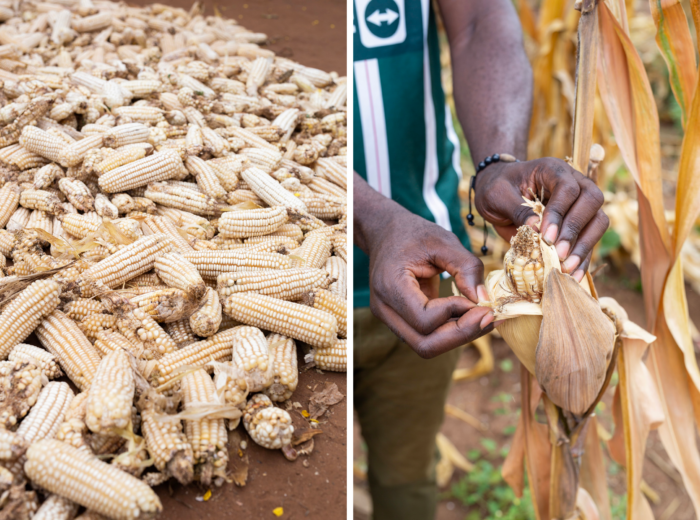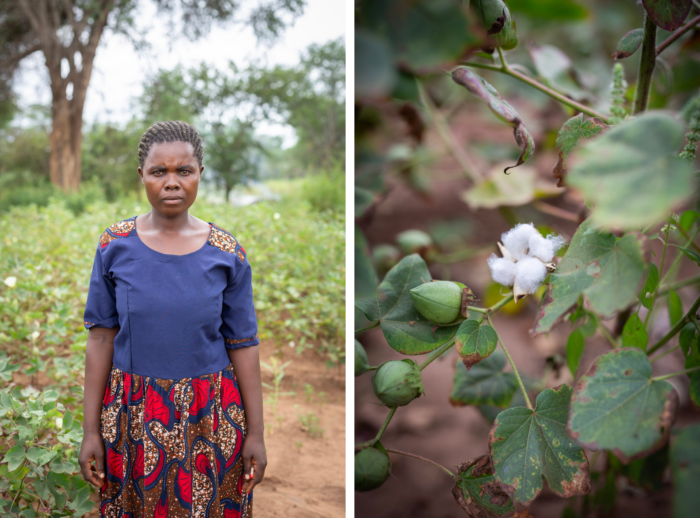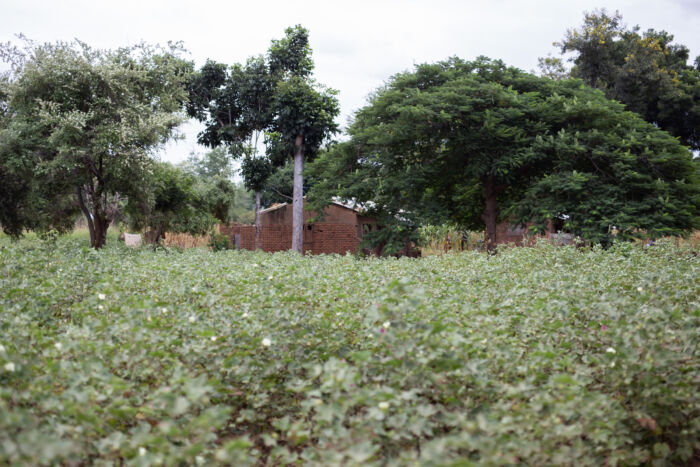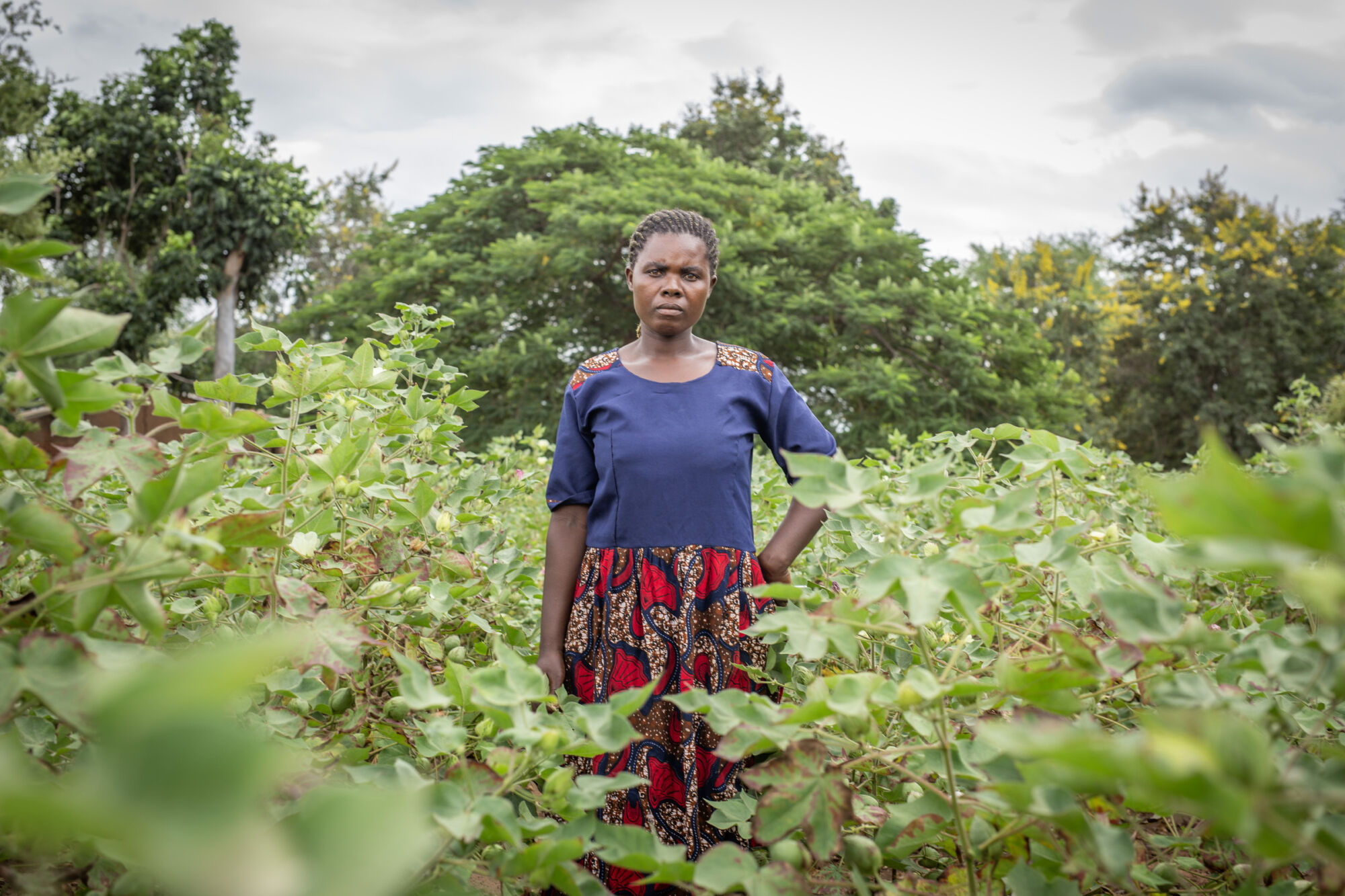The gentle breeze causes the cotton plants to sway gently. In the shade of the leaves, a dog rests, breathing rapidly. We stand on the bumpy and dusty road of packed clay, right next to the young couple Eunice and Moses Tsamba’s field in the Salima district, central Malawi. Eunice carries her eight-month-old daughter, who is sleeping in a baby sling on her back.
Normally, the couple’s cotton plants would reach Moses’s shoulders, but now they only reach waist height.
– The drought that hit our area at the beginning of the year prevented the plants from growing properly, Moses explains.
For families that rely solely on maize farming, the drought has been a disaster. Next to the couple’s brick house lies a pile of freshly harvested maize. The effects are evident. Moses picks up a few cobs and shows us. Many are uneven and small.

The young couple began growing cotton back in 2015. At that time, cotton farming was the family’s only source of income.
– We used local seeds back then, which gave poor yields, and it was hard to make ends meet. Farming was our only source of income, and during a year with severe drought, we were left without any income, Eunice recalls.
For many smallholder farmers, the high costs of inputs, such as seeds and fertilizers, are a major challenge. Eunice and Moses had to borrow money from the local savings and loan group to buy seeds for this year’s crop. In Malawi, investment levels in research and seed breeding have been low, making the country dependent on importing expensive hybrid seeds from as far away as India. Combined with climate-related challenges, it is difficult for many to make a living from cotton farming, especially women.

Despite women in Malawi making up nearly 80% of the agricultural workforce, they do not have the same access and participation rights throughout the cotton value chain—from production to sales—as men. Women often work in preparing the land, sowing, and harvesting, while men are more prominent in the later stages of the value chain, such as marketing and sales. Women have limited, and sometimes no, access to productive resources, such as land and machinery, and to financial services. Cultural norms and values still dictate working conditions between men and women, resulting in women’s exclusion from economic development and equal opportunities to escape poverty.
Education That Yields Results
Eunice and Moses, along with other family farmers in Salima and the districts of Mangochi and Balaka, are part of the “Women Economic Empowerment for Cotton Value Chain” project. The project is implemented by We Effect’s partner organization, The African Institute of Corporate Citizenship (AICC), and aims to empower women and youth in the cotton sector in Malawi. Through a gender-transformative approach—an approach that tackles the root causes of inequality between men and women rather than just treating the symptoms—more women in the project have been able to take on leading roles in areas such as marketing. Now, women, men, and youth work together to improve the cotton value chain.
– For us, it’s about changing farmers’ and especially women’s perceptions of themselves. We want them to start seeing themselves as capable agricultural entrepreneurs, says Driana Guwa Lwanda from AICC.
The project aims to increase women’s and youth’s access to resources, financial services, and advisory services. An important part is also increasing knowledge about climate change and sustainable farming methods so that farmers’ yields increase and provide more returns. This also makes them less vulnerable when crises strike. The training primarily takes place through study circles and is passed on to other farmers in the area to reach as many people as possible. Eunice, who takes care of the crops at home, has participated in several study circles and implemented her knowledge on the family’s cotton field. The results of the training are visibly evident. On the other side of the dusty road, the neighbor’s cotton plants only reach knee height, even though they were planted at the same time and in the same type of soil and climate.
– He still uses the old methods, Eunice explains.
Access to better seeds and proper spacing between plants has made a significant difference. Despite the drought affecting this year’s crop growth, the family will manage thanks to the changes they have made.
Investments for a Secure Future
In 2021, when Moses and Eunice became part of We Effect’s project, they were able to increase their income enough to invest their profits. During the first two years, the harvest increased, and they saved enough money to build a new house. Moses has also been able to get an education and now works at the local hospital, further increasing and securing the family’s income.
– The increased harvest and being part of the project have made it possible for us to get better prices for the cotton and access a larger sum of money at once. This has been crucial for making investments, says Eunice, pointing to the new house the family has built.
In the future, they dream of building another house on the land they have bought nearby to rent out.

In Malawi, many challenges remain that hinder a successful cotton sector. To influence development for the country’s cotton farmers, AICC has created platforms where farmers can meet with traditional leaders and policymakers to reach a common understanding and influence decision-making.
– The drought-resistant and high-yield seeds need to become cheaper, says Moses.
If the farmers succeed in influencing policymakers, we might hopefully stroll between two cotton fields that both reach us to the waist on our next visit. Or maybe even to the shoulders.
